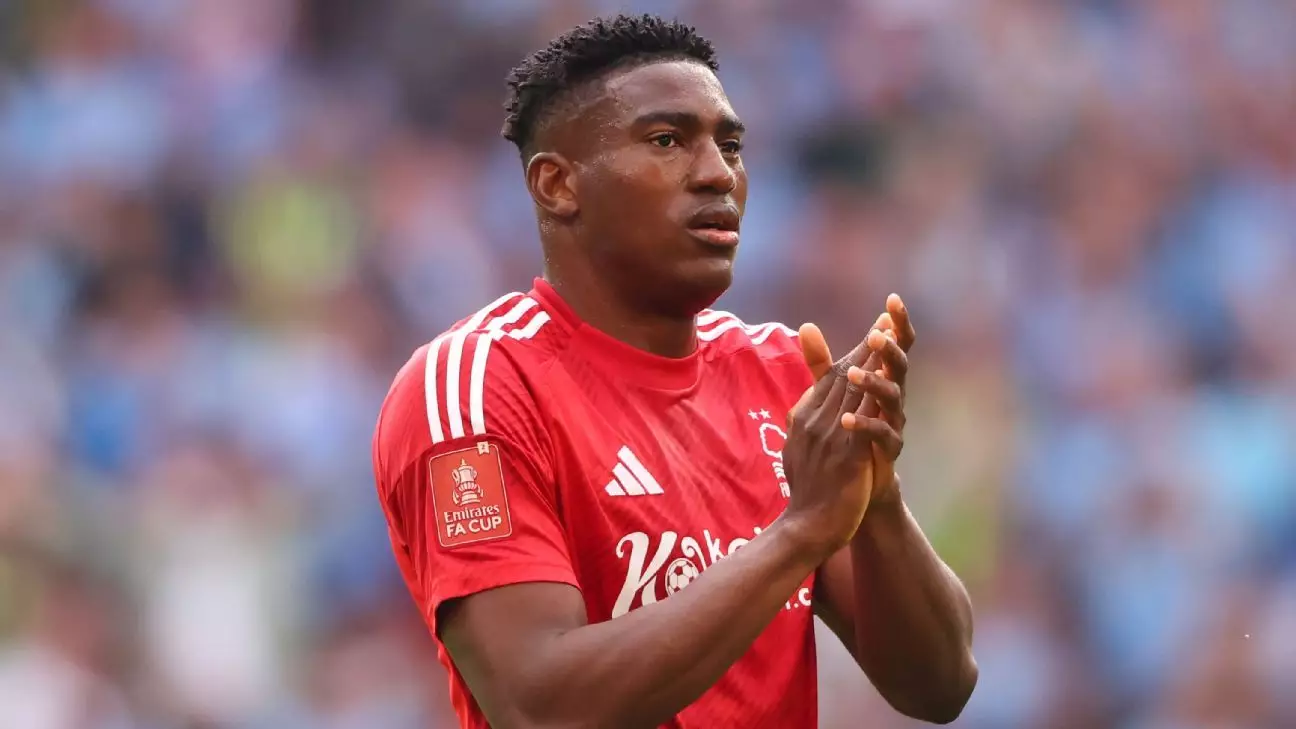In the realm of competitive sports, athletes often risk their health for the love of the game. Unfortunately, not every story has a fairy-tale ending. The recent plight of Nottingham Forest’s striker, Taiwo Awoniyi, epitomizes this reality. Awoniyi was placed in an induced coma following surgery for a significant abdominal injury sustained during a match against Leicester City. This incident has sparked discussions far beyond the pitch, raising questions about player safety, communication within teams, and the sheer unpredictability of professional sports.
Awoniyi’s injury occurred after a collision with the goal frame, an impactful moment that had fans gripping their seats in horror. The aftermath of the injury led to a dramatic narrative that spins from player health concerns to managerial responsibilities and ownership dynamics. While these elements may appear to be separate issues, they are interconnected strands woven into the larger tapestry of sports governance and player welfare.
Behind the Scenes: Managerial Tensions
The reaction to Awoniyi’s injury didn’t just happen within the medical team; it reverberated through the ranks of Nottingham Forest’s powerhouse. Post-match discussions revealed tension between owner Evangelos Marinakis and manager Nuno Espirito Santo, underscoring a miscommunication that contributed to the situation. While Espirito Santo made the call to keep Awoniyi on the pitch after the initial treatment, the repercussions of that decision played out in real-time, diminishing Forest’s chances of victory against Leicester as the striker battled through visible discomfort.
Marinakis’ venture onto the field to express his frustration was a pivotal moment, shedding light on the emotional weight carried by club ownership. The statement released by Nottingham Forest emphasized Marinakis’ profound care for his player, encapsulating a protective instinct fueled by genuine concern — an emotion that transcends financial stakes in the game. His frustration exemplified a passionate commitment to the well-being of his team members; a dynamic that goes beyond numbers and statistics.
The Human Side of Football
At its core, football transcends mere entertainment; it is a vivid tapestry woven from the threads of human experience, emotions, and relations. Players are not just commodities; they are human beings who invest their heart and soul into their craft. Awoniyi’s journey, now marked by his induced coma to aid recovery, poses a critical reflection on how professional sports influence an athlete’s physical and mental health.
In an age where the pursuit of glory and financial rewards drives athletes, the very real danger of severe injuries often lurks behind every tackle, shot, and goal. How teams respond to such incidents can redefine their ethos and identity. This isn’t merely about a team losing a critical match—it’s about the holistic support systems that a club must cultivate, ensuring player safety and mental well-being at every level.
Looking Ahead: The Champions League Dream
As Nottingham Forest continues its pursuit of Champions League qualification with two crucial matches remaining, the shadow of Awoniyi’s injury looms large. Positioned seventh in the league and just one point shy of fifth, their aspirations hinge not only on athletic performance but also on the team’s collective resilience and spirit in the wake of adversity.
Awoniyi’s situation offers a unique perspective: he has become emblematic of the struggles that athletes face and the lengths they go to represent their teams. Surrounded by club members who visibly care, the response from fans and players alike could demonstrate a larger turning point in how we perceive the fragility of athletic careers and the genuine empathy that should accompany every competitive encounter.
In these moments, the goal is not merely to salvage a season but to emerge as a cohesive force intertwined with the heartbeats of athletes and ownership alike, focused on what truly matters beyond the scoreboard—the wellbeing of every individual who steps onto that field.


Leave a Reply